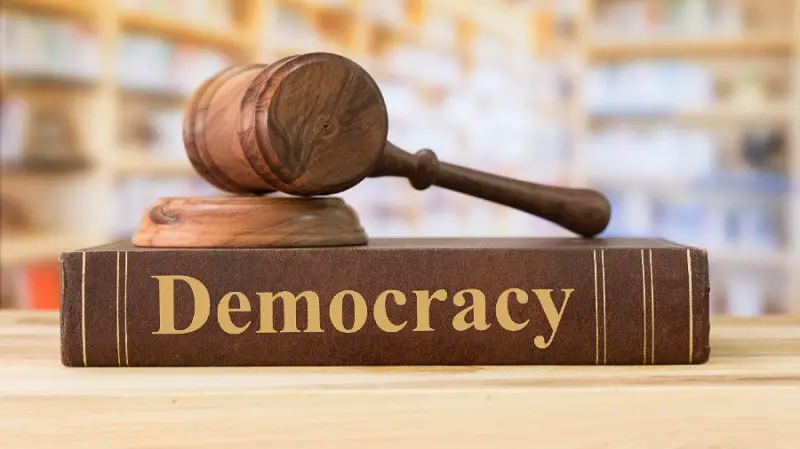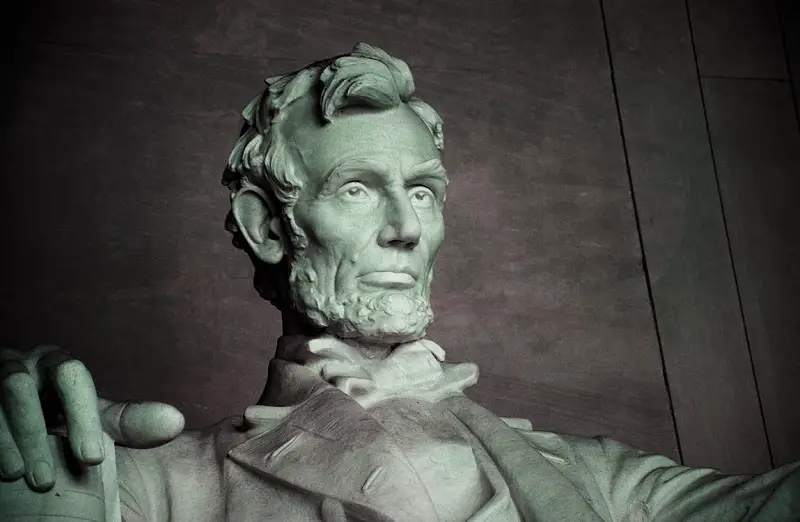Democracy is a form of government in which power is held by the people, as they elect representatives to make decisions on their behalf.
It is one of the most popular forms of government around the world today, and it has a long history that dates back thousands of years.
In this blog post, we will provide a simple definition of democracy and explain the key features that define it.
The Simple Definition of Democracy

Democracy is a form of government that allows citizens to participate in the decision-making process.
In a democratic system, people have the power to elect their leaders and representatives through free and fair elections.
The simple definition of democracy is that it is a political system where the majority rules, but with respect for the rights of minorities.
Democracy also means that every citizen has equal opportunities to express their opinions and ideas, regardless of their socioeconomic status, race, or gender.
It promotes freedom of speech, assembly, and association as fundamental human rights. In addition, democracy encourages transparency and accountability in government affairs so that citizens can hold elected officials responsible for their actions.
Democracy is about empowering citizens by giving them a voice in shaping policies that affect their lives. It provides an environment where individuals can thrive freely without fear of victimization or oppression from those who hold positions of power.
Democracy is a form of government that allows citizens to have a say in how their country is run. It is characterized by free and fair elections where everyone has the right to vote.
The word democracy comes from the Greek words “demos” meaning people, and “Kratos” meaning power or rule. In essence, democracy means “rule by the people.”
In a democratic society, leaders are elected through regular elections and held accountable for their actions.
Citizens have basic rights such as freedom of speech, assembly, and religion. They also have equal protection under the law regardless of race, gender, or social status.
The concept of democracy has evolved over time with different countries implementing it in various ways based on their unique cultures and traditions.
Democracy Definition for Kids

As parents and educators, we understand the importance of teaching children about democracy. However, explaining complex political concepts to kids can be challenging.
With that in mind, let’s explore what democracy means for kids.
At its core, democracy is a system of government where people have a say in how they are ruled.
In a democratic society, citizens elect officials to represent them and make decisions on their behalf.
This means that everyone has an equal voice and gets a fair say in the choices that affect them.
In practice, this means that individuals are free to express their opinions without fear of punishment or persecution.
It also means that decisions are made through open discussion and debate rather than by force or coercion.
By teaching our children about democracy from an early age, we can help them understand the importance of civic engagement and empower them to become active participants in shaping their communities.
Democracy is an important concept for kids to understand as they grow up and become responsible citizens.
At its core, democracy means that people have the power to make decisions about their own lives.
This includes the ability to vote for leaders who will represent their interests and values.
In a democratic society, everyone has equal rights and opportunities regardless of their race, gender, or social status. This is because people are free to express themselves without fear of persecution or discrimination.
Furthermore, democracy encourages critical thinking and open dialogue among individuals with different opinions.
As children learn about democracy, they also learn about the importance of respecting others’ opinions and working together towards common goals.
They discover that compromise is essential in a democratic system since not everyone can get what they want all the time.
Democracy Definition by Abraham Lincoln

Abraham Lincoln is known for his leadership and contributions to American society. One of his most notable achievements was his definition of democracy which still resonates with people today.
According to Lincoln, democracy is a system of government where all citizens have equal rights and opportunities, regardless of their social status or wealth.
For Lincoln, democracy was not just about the principles outlined in the Constitution; it was about ensuring that everyone had access to those rights.
He believed that every person should be able to live freely without fear or oppression from anyone else. This idea was reflected in his famous speech where he stated: “government of the people, by the people, for the people shall not perish from the earth.”
Lincoln’s definition of democracy has become a guiding principle for many nations around the world. His belief in equality and fairness has inspired millions to fight against injustice and inequality.
Principles of Democracy

Democracy is a system of government that emphasizes the participation and empowerment of the citizens.
It’s based on certain principles that enable people to have an equal say in matters concerning their lives. The Principles of Democracy are essential in defining the character and functioning of democratic societies.
The first principle of democracy is popular sovereignty, which places power and decision-making authority in the hands of the people.
This means that citizens have a right to vote for leaders, express their opinions on issues affecting them, and participate in decision-making processes.
Secondly, democracy upholds individual rights such as freedom of expression, assembly, religion, press, and association. People are free to speak out against injustices without fear or reprisal from those who hold power.
Advantages of Democracy
Democracy is a form of government that has several advantages over other systems.
The first advantage is that it ensures equal representation for all citizens, regardless of their social status or economic background.
This means that everyone has an equal say in how the country is run and can participate in the decision-making process.
Another advantage of democracy is that it promotes stability and peace within a society. Because decisions are made through a democratic process, there is less chance for conflict or violence to erupt between different groups with differing views.
Additionally, democracies tend to have better human rights records than non-democratic regimes because they are more responsive to the needs and concerns of their citizens.
A third advantage of democracy is its ability to foster economic growth and development. In democratic countries, businesses can operate freely without fear of arbitrary government intervention or repression.
Challenges to Democracy
Democracy is often touted as the best form of governance, but it is not without its challenges. One of the primary obstacles to democracy is corruption.
When leaders prioritize their personal gain over the welfare of their citizens, it can lead to a breakdown in trust and accountability.
This can make it difficult for democratic institutions to function effectively and maintain public confidence.
Another challenge facing democracy is polarization. In a polarized society, individuals may become so entrenched in their beliefs that they are unwilling to compromise or engage with those who hold different views.
This can create a toxic political environment where progress becomes impossible, as both sides refuse to work together or find common ground.
Finally, there is also the issue of voter apathy. As democracies mature and become more established, some citizens may begin to take their right to vote for granted or lose interest in political affairs altogether.
The Simple Definition of Democracy (Summary)
Democracy is a system of government in which citizens are granted the power to determine the laws and policies of their country through public discussion and voting.
It is based on the principle of majority rule but also ensures minority rights are respected.
Although it can be challenging to ensure that everyone has a voice, democracy remains an essential part of many countries around the world.
With advances in technology, people have more ways than ever to exercise their democratic rights as citizens.
If you’ve made it this far on this blog post, we’ll assume that by now, you should understand the simple definition of democracy, its benefits, challenges, as well as its principles.
Other Blog Posts
